Part
2: Welcome to the World of Tomorrow
First
encounters, the director's cut and the critical turnaround
on

by
Slarek
"I
want to become the John Ford of Science Fiction Films." |
Director
Ridley Scott to science fiction
writer Harlan Ellison, circa 1988 |
"They
don't advertise for killers in the newspaper."
Back
in 1982, things were not going well for me. My initially
positive experiences with the film industry had turned
sour, in part because I'd failed yet to learn the industry maxim that
each job you do is really about the next one, and my
inability to charm people I regarded as dickheads was
shutting doors like there was a force nine gale blowing
through my working life. I'd taken a crap job to pay the
bills, one made tolerable only by the earthy humour
of my workmates. They liked to have the radio playing
all day and provided a sometimes painfully funny running commentary on the
music that escaped from it. Occasionally,
we got a break from the pop onslaught in the shape
of interviews with musicians and actors – these did not
interest my colleagues and so I got to listen to them
uninterrupted. Unbeknown to me, the seeds for my love
affair with a certain science fiction film were to be
sown right there.
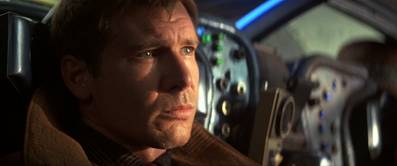
I
knew about the existence of Blade Runner,
of course. What genre fan didn't? Alien had been a genuinely life-changing experience for me,
as terrifying and exciting a time as I've ever spent in
a cinema. I'd loved The Duellists, Ridley
Scott's first feature, but Alien had
proved a whole different ball game. Science fiction had
been turned on its head, mated with gothic horror, doped
up on Freud and shaped into to a work that was to change
the genre forever. Gone was the hospital-clean look of 2001 to be replaced by a dark industrial functionality,
spaceships that were built and inhabited by the proletariat. And
now Scott was making another science fiction film. Oh
boy.
I
didn't know Philip K. Dick's book Do Androids Dream
of Electric Sheep and at that point did not even
realise this new film was based on it. I didn't know much
about the film at all, just snippets in the genre press (mainly
the UK sf/horror film monthly Starburst) and
the odd intriguing photo of a crop-haired Harrison Ford.
The release date was still some months away, but my anticipation
was starting to build, and thanks to a comment made on
the radio at work by John Hurt, it was about to take a
kangaroo-sized leap. Hurt was being interviewed about
his career and his latest film (I cannot recall what it
was), and the conversation eventually moved
round to his spectacular demise in Alien.
The interviewer, clearly a fan of the film, said (and
this may not be verbatim, but is as close as I can remember):
"What
struck me most about Alien was its realistic environment,
it's sense of place – I mean you really felt like you
were on that spaceship."
And
John Hurt, bless him, replied with barely concealed excitement:
"Oh-ho,
you wait until you see Ridley's new film!"
I
think I actually dropped what I was doing at this. It
remains the best movie teaser I have ever had thrown
at me.
"It's not fancy or anything, is it?"
I
had a friend in those days, as close as any I have had
since or can ever imagine having again, one who was by
turns hilarious, imaginative, infuriating, outrageous,
and a whole sack of other attributes both positive and
negative, a true Withnail to my Marwood. I can't remember
which one of us opened that month's Starburst to the page that announced that there was to be a preview
screening of Blade Runner, but whoever
it was they were on the phone to the other within minutes.
It was being shown simultaneously in three cities, a good
two to three months before it went on general release, and
all you had to do to get in was turn up waving a coupon
contained within that magazine's pages.
We
met up the day before the screening and, knowing that
the London one would be particularly well attended, we pledged
not to drink too much that night in order to aid an early
rise the following morning. We got plastered. We always got plastered when we
met up. The early rise and journey to Shaftsbury Avenue
the next morning was thus a difficult one, and despite
arriving three hours before the screening, there was already
a substantial queue snaking around the cinema exterior.
One
thing you don't expect to have hear when you arrive at
such a screening is a voice shouting "What the fuck
happened to you?" but that's what greeted me. Camus
and I had been at film school together, albeit briefly.
He was in the year below me, but we were kindred spirits
who very quickly found each other, or rather were pointed
in each other's direction by the head of the school. I was shamefully idling my way through
the course, but Camus soon tired of how things were progressing
and dropped out and went off to Hollywood to look for work.
And found it. We'd stayed in touch for a while, but communication
in these pre-internet days had faltered. It never occurred
to me, although it really should have, that he'd be at
the screening too. A good omen.
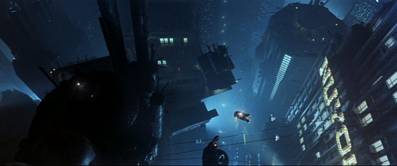
Where
Camus sat I am not sure, but Withnail and I were front
and centre, and the ABC Shaftsbury Avenue has – or certainly
had – a big bloody screen. This was and remains one of
the most charged audiences I have ever been in, and I
was there for the opening night of Return of the
Jedi, where a good twenty percent of the attendees
were dressed in full costume and danced in the aisles when
the Emperor was killed. The Blade Runner audience was made up solely of the generically devoted, hundreds
of hard-core science fiction fans all twitching with anticipation
at what they were about to see. Everyone was talking to
everyone else, and the excitement was generating a thrilling
buzz of electricity.
I
remember the opening credits, partly for the music, but
mainly for the cheers that greeted the names Harrison
Ford and Ridley Scott, and the all-female whoop that sounded
for Rutger Hauer.
And
the opening. Oh man, if ever I was swept away by a first
few seconds, then 2019 Los Angeles, viewed on that screen,
was that moment.
The
film that unfolded was spellbinding, exciting, beautiful – a totally cinematic experience. Visually it was
and still is stunning, but in a way that feels organic
to the place and story, building on the industrialisation
of the future to – accurately, I believe – reflect the
duality of a technologically progressive society, where
new invention is surrounded by the debris of its development
and the make-do struggle of those left in its wake, whose
lives Scott once again aligns us with. The cultural mix
of the locality is such that a new language, city-speak,
has developed that owes only part of its lineage to English,
and the skyline more closely resembles that of Tokyo than
Los Angeles. The soundtrack is equally mesmerising, blurring
the distinction between music and sound effects to such a
degree that there are times when you genuinely cannot
tell where one ends and the other begins, a constant city-song
of flying cars, floating advertising hoardings, street
sounds and industry. And Hurt was right – never have I
been more convinced of the reality of a future vision
than the one presented here.
The
narrative functions on several levels, as a Chandler-esque
detective story (the The Big Sleep is a recognisable influence), as dystopian vision
of a future corporate-run America, as an examination of just
what constitutes humanity, as a fated and unconventional
love story. And they all work. Withnail and I were both
left reeling and stumbled out of the screening and into
a pub, where we drank an awful lot of ale and wandered
out into Chinatown in a dazed attempt to recapture the
atmosphere of the film. It seemed only right that it was
raining.
"All I could do was sit there and watch
him die."
Between
this screening and its eventual release I got everyone
I knew fired up to see the film, and when they did they
all loved it. But all was not well in the land of critical
analysis. Younger viewers coming to the film today do
so with an awareness of its classic status – it has become a standard text on film and media studies courses, has
been the subject of numerous literary evaluations, and
has influenced the work of any number of subsequent filmmakers.
It was even listed as number 7 in a list of the 10 greatest
films of the past 25 years compiled by Sight &
Sound in 2002. And yet on its release there was barely
a critic anywhere who had a good word for it. Indeed,
a fair few openly hated it. Writing in Starburst,
John Brosnan described it as "a masterpiece,"
but added that it was "much to my surprise."
Another very positive review in either Time Out or City Limits (I cannot remember which) attracted
a barrage of angry letters berating the reviewer for standing
up for a film that they believed was callously misogynistic.
And this was the positive stuff. Elsewhere critical guns
were loaded, aimed and fired squarely at a film whose
production design was deemed its only positive feature.
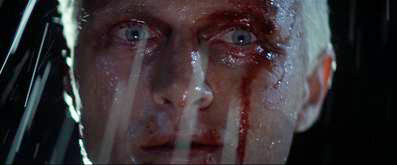
So
what happened? How did Blade Runner make
the transition from Most Hated Film of The Year to Modern
Classic? Was the film so far ahead of its time that it
took a new generation of critics and writers to appreciate
its achievement (a fate that also befell the greatest
of all science fiction films, 2001: A Space Odyssey)?
Did the cult that started at screenings like the one I
attended grow to such a degree that it engulfed much of
negative critical response? Did the original naysayers
have a rethink when they realised they were out of step
with the film's later re-evaluation? It could well be
down to a combination of all three. The process was certainly
a gradual one, and to a certain extent caught me by surprise.
If the expanding cult following theory is correct then being part
of that cult from its inception perhaps made it hard for me to see
beyond its borders until the day I suddenly realised just how
far it had spread. One
thing for sure is that there was, in retrospect, a clear
shift of critical opinion and some obvious attempts to
disguise or deny that initial hostility. Film writers
everywhere suddenly wanted to be aligned with the cult,
to be thought to have been all for the film when others
were throwing their critical rocks. Which brings me nicely
back to that Sight & Sound poll.
Now before I go any further I should state that for my
money Sight & Sound is far away the best
film magazine on the market. It contains detailed and
well-written articles on the films and filmmakers I am
interested in and perceptive and intelligent film
reviews, so I have no axe to grind here, just a point
to reinforce. For those of you too young to remember,
the Sight & Sound we know today is actually
a composite of two magazines, both published by the British
Film Institute. The original Sight & Sound was a highbrow quarterly consisting of articles on films
and filmmakers, while Monthly Film Bulletin was
the review magazine. Thus when the modern hybrid that
is Sight & Sound today published their list
of the Ten Greatest Films of the past 25 years, they included
an extract from Tom Milne's original Monthly Film
Bulletin review of Blade Runner.
And a very positive extract it was too. I quote:
'It's
not hard to see why Philip K. Dick expressed his approval
of the original script in interviews, since a potentially
intriguing narrative line has been evolved, eventually
bearing fruit of sorts in the scene where the replicant
Roy confronts his creator, who welcomes him as a prodigal son but can offer no hope to his anguished cry of "I want more life, father."'
But
for those of us who remember that review, and especially
those of us who still own a copy of Monthly Film Bulletin number 584, a small double-take was in order. So you're
telling me now that Tom Milne liked the film,
that Monthly Film Bulletin had recognised the film's greatness
from the start? Hmm... Let's have a look at the sentence
that immediately follows that quote:
'The
trouble is that this theme of the progressive humanisation
of the robot is so entwined with irrelevant motifs left
over from Dick's novel, which are in turn so buried in
frequent and gleeful (but curiously ineffectual) bouts
of violence, that the result is an aimless muddle.'
Or
how about this:
'The
sets are indeed impressive (especially the rubble-strewn
desolation of Sebastian's apartment block, the skyscraper-high
neon ads that line the streets, and the steamy claustrophobia
of a permanently rainy Chinatown), but they are no compensation
for a narrative so lame that it seems in need of a wheelchair.'
Aside
from the fact that I believe, and always did believe,
that Mr. Milne was talking complete twaddle about a narrative
that is far more layered than he and many others seemed
either aware of or were prepared to admit to, his review,
and the extract pulled for the Sight & Sound poll, has a revealing glitch. As many will no doubt have
spotted, Roy's exclamation to Tyrell is not an anguished
"I want more life, father," but a very threatening
"I want more life, fucker!" Now some will write
this off as Milne not paying attention, but this alternate
line does indeed exist and was part of the 113 minute
70mm working cut that was shown only briefly at sneak
previews in London and the USA (and later received limited
screenings selected US theatres). The version Milne saw
was thus not the one that went on general release.
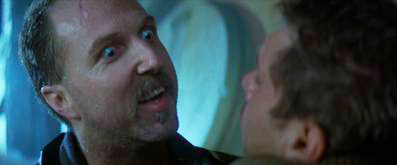
But
there's more. Elsewhere in issue 584 of Monthly Film
Bulletin, Steve Jenkins favourably reviewed Clare
Peploe's short film Couples & Robbers and predicted that it would prove a pleasant surprise
for those happening on it by chance, 'especially
as support to Ridley Scott's dire Blade Runner.'
What was that word again? Dire? I notice that wasn't quoted
for Sight & Sound's poll.
I'm
not sniping for the sake of it here – I myself glean all
manner of positive adjectives from reviews when publicising
film seasons for our film society, and for
years distributors have been lifting upbeat segments from
otherwise less favourable reviews to slap on film posters.
But it does all serve to illustrate the complete critical
turnaround that has occurred in the years following the
film's release.
Now
there are those who will tell you that this is primarily
down to the release of the so-called 'director's cut'
of the film, which those in the know are aware was nothing
of the sort (see Camus's comments on this). For years
there had been complaints about the ending, the voice-over
and the missing unicorn shot that obliquely suggested
Deckard was himself a replicant. OK, sure, the ending
kicked against the film's own logic and was intercut with
outtakes from The Shining. But the issue
of the voice-over is not as clear cut as some continue
to claim, with some of the stories surrounding its inclusion
repeated so often that it became impossible to tell truth
from myth. The most commonly heard of these was that the
Harrison Ford had delivered a deliberately dreary narration
as a protest at its inclusion. A lesson is called for,
I believe, on the difference between dreary and world-weary,
the latter a recognisably Chandler-esque quality that
sat well with the film's noir detective borrowings. Whether
it is better or worse without it is a matter of opinion,
but as Camus states in his piece, it was there when we
first saw and first fell in love with the film and we
should thus still be able to view it with the voice over intact should
we choose to do so. I would also argue that there are times where
the removal of the voice-over is keenly felt, with the editing
of some sequences clearly timed for its inclusion and their
rhythm noticeably disrupted by its excision.
When
the three-disc Final Edition arrives (five disc, as it turned out), comparisons will
be more widely made, though I have a sneaking suspicion
that the vast majority of those arriving at the original
cut having only previously seen the 'director's cut' will
react negatively. That cut is for the old hands, those
who were there at the beginning. Either way, home video
is no place to judge. Like 2001 before
it, Blade Runner's extraordinary impact
is severely diminished on the small screen and it's going
to take a High-Definition-Plus disc playing on a top-of-the-range
100-inch LCD screen with DTS sound to come close to the
experience of seeing it in a top London cinema. But for
now we have DVD, which is still a bloody big leap up from
the tape prints we put up with for so long, and Warner
have, in advance of the Final Cut, re-released the 'director's
cut' as a stand-alone disc one final time...
Looking
at the box and the complete lack of extra features, this
looks like a simple re-issue by Warner of their 1999 release,
but sit down in front of both and the differences soon
show. For a start, the print on the new release uses the
whole width of the screen rather than sitting inside black
side borders, with the result that there is more picture
information on both sides (although CRT TV owners may
lose this to overscan). The print has also been cleaned
up, the dust spots of the first release now nowhere to
be found. Contrast and sharpness have been improved, the
brightness tweaked (though very occasionally at the expense
of highlight detail), the colours are slightly richer
and there is a subtle shift in the colour timing of some
scenes – I have to presume, though cannot confirm, that
the new transfer is more faithful to the original film
print. There is still some visible grain on a few of the
effects shots, but otherwise the film looks damned fine.
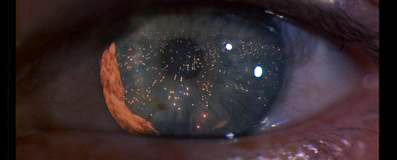
1999
release (above) and 2006 release (below) – note the
extra picture information on the new release
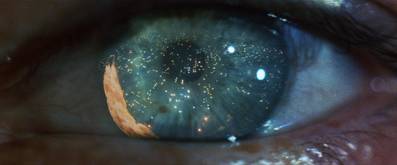
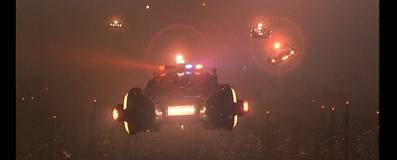
1999
release (above) and 2006 release (below) – the shift
in colour timing is clearly evident here
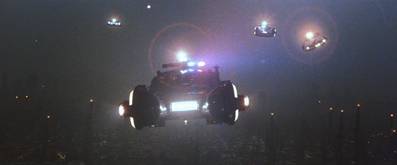
Oh
if only the sound had undergone a similar upgrade. What
we have here is exactly the same 5.1 track as was found
on the original release, one that lacks punch, volume
and the sort of all-around aural inclusiveness that the
film screams out for. If this means that a remix is required
for the Final Edition then it gets my vote, as the film's
beauty as an audio-visual experience is severely diminished
when half of the marriage is not up to scratch.
As
with the original release, not a bloody thing. No doubt
it's all being held back for the Final Edition release.
I've
said all I intend to say for now about the film. If you
have the earlier DVD release than this may be worth the
upgrade for the picture quality, but it may be worth hanging
on to see what turns up in the Final Edition, which is
expected to include all three cuts of the film, hopefully
with remastered sound as well as picture.
<<Part
1: Man and Machine, Kendred Spirits
Blade Runner: The Final Cut Ultimate Edition DVD review